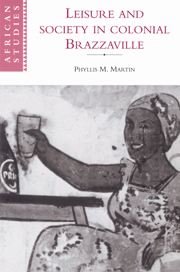Book contents
- Frontmatter
- Contents
- List of plates
- List of maps
- List of tables
- Acknowledgements
- List of abbreviations
- Introduction
- 1 An African crossroads, a frontier post and a colonial town, c. 1880–1915
- 2 Taking hold of the town, c. 1915–1960
- 3 The emergence of leisure
- 4 Football is king
- 5 About the town
- 6 Dressing well
- 7 High society
- Conclusion
- Notes
- Bibliography
- Index
- Titles in the series
3 - The emergence of leisure
Published online by Cambridge University Press: 09 November 2009
- Frontmatter
- Contents
- List of plates
- List of maps
- List of tables
- Acknowledgements
- List of abbreviations
- Introduction
- 1 An African crossroads, a frontier post and a colonial town, c. 1880–1915
- 2 Taking hold of the town, c. 1915–1960
- 3 The emergence of leisure
- 4 Football is king
- 5 About the town
- 6 Dressing well
- 7 High society
- Conclusion
- Notes
- Bibliography
- Index
- Titles in the series
Summary
The sounds and sights of time were evident in the colonial town in the form of bugles, gunshots, bells, drums, watches and clocks. People responded to them according to the level of their contact with urban institutions. The most affected were wage-labourers and Christians. There is evidence that an ‘uneven’ experience of time persisted and that the articulation of temporal patterns was central in the negotiation of relationships. Those most oppressed by time through their conditions of employment developed a keen awareness of their right to ‘free time’ and resisted attempts by employers, administrators or teachers to encroach on it.
Europeans had a large stake in the time of their workers, subjects and converts. Missionaries everywhere were engaged in the grand task, ‘to remake Africans through their everyday activities’ and Congo was no exception. In their quest to develop a Christian elite, missionaries prescribed disciplined notions of time, work and leisure, as the panacea for the prevailing sickness of ‘laziness’. Administrators and employers shared similar notions that time-discipline was a basic step in ‘accustoming the native to regular work’ and ‘creating a disciplined workforce to open up the country’. Europeans intervened in African leisure time when the health and efficiency of the workforce seemed to be at stake, or when African activities impinged on the insulated life of the white community. The self-employed or unemployed were not outside the range of European interest, as they were part of the environment in which labour was reproduced. Laws against vagrancy and fines levelled against unpunctual employees show a continuing struggle over defini'tions of time and order.
- Type
- Chapter
- Information
- Leisure and Society in Colonial Brazzaville , pp. 71 - 98Publisher: Cambridge University PressPrint publication year: 1996



